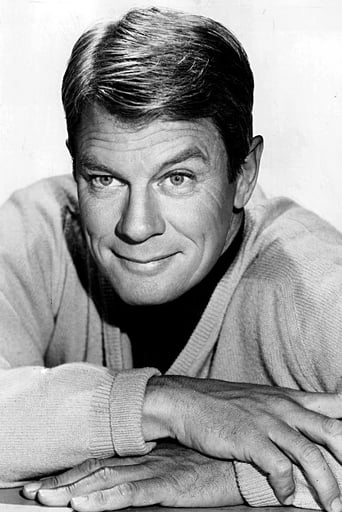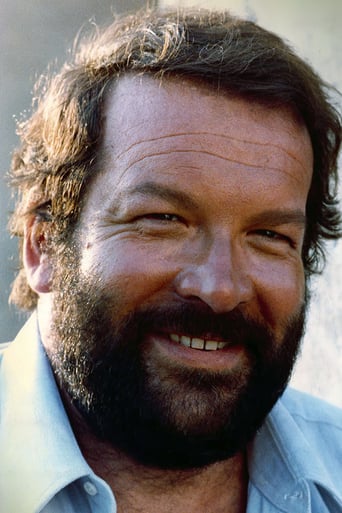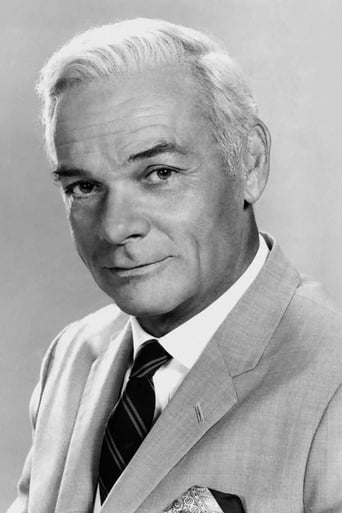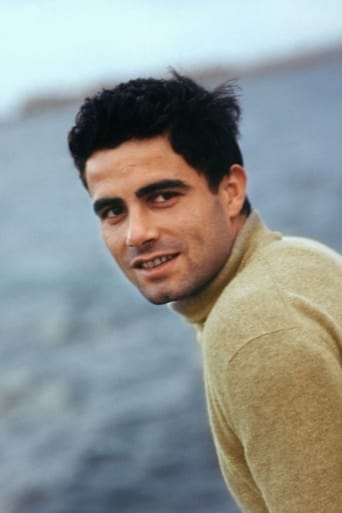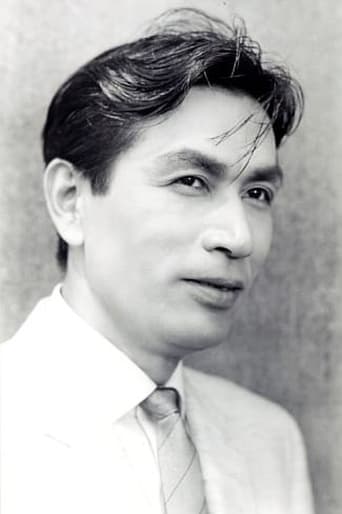Claudio Carvalho
The Mexican emissary and former acrobat Luis Dominguez (Nino Castelnuovo) comes to America to summon the outlaw Mesito (Bud Spencer) that is working in a farm; the gambler and expert in dynamite Capt. Nicolas Augustus (James Daly); and the mute Japanese Samurai (Tetsuro Tamba) that has a great skill with knives under the call of their acquaintance Dutchman (Peter Graves) from Mexico with the promise of a reward of one thousand dollar for each one. When the five men reunite, Dutchman explains that there is a big, fat, juice train transporting five hundred thousand dollar for the Dictator General Huerta and the leader of the revolutionary forces proposed them to rob the train to support the peasants and the revolution. However, the plan seems to be impossible to be accomplished since the train is protected by an army, but the five men decide to rob the gold and double-cross the revolutionaries. But some of them have hidden intentions… "Un Esercito di Cinque Uomini" is a "spaguetti" western at best. The story, with screenplay of Dario Argento, is full of action and betrayals developed in a fast pace and with a great camera work. The result is a funny and entertaining movie, with situations resolved in the most impossible way. My vote is seven.Title (Brazil): "Exército de 5 Homens" ("Five Man Army")
Lee Eisenberg
One of the many spaghetti westerns apparently filmed in English, "Un esercito di cinque uomini" (called "The Five Man Army" in English) is nothing really special but worth seeing. Peter Graves plays Dutchman, an American outlaw leading four other men to capture some gold to donate to the Mexican Revolution. This movie really has the feeling of a spaghetti western, what with Ennio Morricone's music and all. The scenery - rolling desert hills - is almost a character itself. Some people may wonder how many movies there can be about people battling corrupt generals, but that misses the point. The point here is to get enthralled, and I'm sure that you will. Overall, the whole movie gives one a really energetic feeling. Pretty interesting, and a neat start for Dario Argento.Watching Peter Graves, I half expected him to blurt out one of his lines from "Airplane!". Maybe that's just me, but he gives me that feeling.
SgtSlaughter
American actor Don Taylor tries his hand at directing a truly international "spaghetti western". A fast pace, fine musical score and satisfactory performances hold this rip-off of "The Magnificent Seven" and "The Wild Bunch" together over the course of nearly two hours."The Dutchman" (Peter Graves) recruits for of his old friends to go on a suicide mission. This involves infiltrating, capturing and then making off with a train filled with Mexican Gold. Each will get a small share; the rest will go to aid the Mexican revolutionary forces that the Dutchman has fallen in with.Young writer Dario Argento's script doesn't hold up to his later flair, but keeps the familiar characters and plot line interesting enough to hold dedicated attention. The Dutchman is the typical hero of the piece, and Graves comes to life despite the fact that we know nothing about his background. He seems a little uncomfortable – somewhat uneasy – although his dedication to the robbery is very convincing. He does introduce the 4 members of the "Army" in an obligatory speech, and the rest of the cast stick their characterizations with little or no added ingenuity.First, there's Augustus (James Daly), a grizzled demolition expert who's been in hiding since Spanish-American War. Augustus and Dutchman are two tired, old men and they have a great dramatic discussion reflecting the changing of the times and how they no longer fit into society. Bud Spencer is a lot of fun as the dimwitted Mesito, a giant whose sole redeeming quality seems to be his brute strength. Interestingly enough, Spencer recorded his own dialog in English, and his real voice simply adds to the humor his character – he's got a thick accent, but good command of English, which balances out perfectly. Then there's Samurai (Tetsuro Tamba) a silent warrior who was rescued from a circus sideshow to help carry out the mission. Rounding out the band is Luis, a former acrobat-turned-outlaw who found a home in the Revolution while on the run from the Mexican Army. Throughout the piece, the heroes are out to satisfy their own greed, but a surprise ending ties together all of the loose ends.The musical score of this piece is above-average work from the always-excellent Ennio Morricone, who contributed scores for some of the best spaghetti westerns, including "The Good, the Bad, and the Ugly". It's appropriately rousing and adds flair to the exciting moments, and occasional mournful and evocative in the slower, sad sequences – notably, Dutchman's moving speech near the end which explains just why he's in league with the Revolution. He also contributes a fine extended, ultra-weird piece when one main character falls from the train and has to run for several minutes to catch up with his comrades.The film never has a boring moment. Taylor keeps his camera moving in every scene, always showing off sagebrush, pueblos and military garrisons which always look and feel real. The movie is about men on the go – it never stays in one location very long, and while there, something exciting is always happening. Every piece of dialog helps to flesh out the characters or explain the mission further. When people aren't talking, they're in an intense situation – whether it be the ambush of a Mexican truck, escape from a military prison, or the lengthy takeover of the train (which, perhaps, is one of the best extended action sequences ever caught on film) – there is never a dull moment.Taylor manages to keep the action interesting enough and different enough in each scene, too – there's not just lots of fast gun-play going on. There is one notable capture-and-escape sequence involving a heavily fortified Mexican garrison, and the 20+ minute sequence depicting the infiltration and capture of the armored train is nail-biting. The stunts look to be performed by the real actors on a moving train – there is no rear-projection here.The production values are higher than usual for this genre. The crowd scenes are truly massive, and Taylor is able to take time establishing his locations using cranes and long pans before jumping right into the action. Although the first half of the film has a dry, depressing look to it (the exteriors are barren and desolate) the second half features several large, open grassy plains – something not often seen in a film of this kind. The territory surrounding the train, especially, looks vast and open – only once do we notice the painfully obvious presence of a sound-stage, as the characters observe the train from a distance.There are a lot of little things that go wrong with the production or some small parts of the film which lack badly needed care, however, which hamper the effectiveness of the proceedings. The second unit direction seems a bit half-hearted. When extras are shot and die, they slump over with considerable effort and never really look to have been shot. There are also noticeable gaps in logic – the heroes board the train in full view of some very unobservant Mexican guards; the main characters seem afraid of a giant cannon on the train, but it's not as though it can fire at them at such a close range. Also, the engineer (Jose Torres) is taken prisoner because he's allied with the military government, but near the climax, his character disappears. One moment he is standing on the train; in the next shot he is simply gone. What happened to him? In the end, "The Five Man Army" is no more than merely a hash of clichés, but manages to be engaging and entertaining throughout without offering anything new and notable.
polies
The Five Man Army is a Spaghetti Western made toward the end of the cycle financed by MGM and Directed by American Don Taylor.The visuals are strong and pacing is adequate with an interesting blend of Italian and American Actors with one Samurai character thrown in. While this film does not have the style of a Sergio Leone Production it does have two very strong elements of his , the screenplay by Dario Argento and the sixth character in the army Ennio Morricone's brilliant score. These themes have haunted me for thirty years since I first saw this film at a drive-in. It is as strong as The Good The Bad and The Ugly. Perhaps not as diverse as Once upon a Time in the West where every Character has their own theme, but every bit as powerful. It is ultimately the score that carries this film, as the acting is pretty stiff. The Screenplay is typical of Argento light on dialogue with a twist at the end, of course this is early in his career. If you like your Spaghetti al dente only you may not care for this film. But if you are like me, a fan of this lost genre you may savor every bite of this Delicious side dish. Makes a great double bill with "My Name is Nobody".

